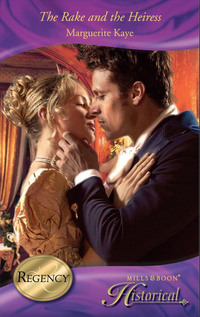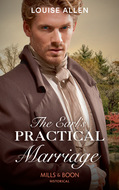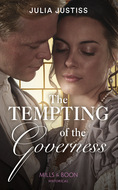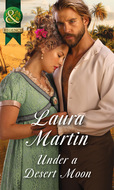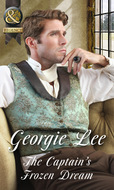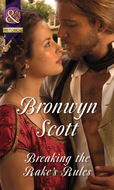Raamatut ei saa failina alla laadida, kuid seda saab lugeda meie rakenduses või veebis.
Loe raamatut: «The Rake And The Heiress»
‘Well, well, what have we here?’ Nick’s voice was low, surprisingly cultured. His tone was teasing. ‘A kiss from the prettiest woman here will be my prize.’
Serena could smell him. Fresh sweat, laundered linen, something else deeply masculine she couldn’t put a name to. Reluctantly she forced herself to hold his gaze, to counter his teasing smile with a haughty look of her own.
‘Definitely the prettiest woman here. A kiss will be worth all the money in the winner’s purse and more.’ The words were whispered in her ear as he pushed back her bonnet, tilting her chin with a firm but gentle finger. He hesitated for a tantalising moment, then pulled her closer, confining the contact to his lips alone.
It was a teasing kiss, which lasted no more than a few seconds. His breath was warm and sweet. His lips were soft against her own.
‘Get off me, you ruffian!’ she said angrily pushing him away. What had she been thinking?
The man who had taken such a liberty eyed her quizzically. ‘Ruffian or not, you enjoyed that as much as I did, I’ll wager…’
Born and educated in Scotland, Marguerite Kaye originally qualified as a lawyer but chose not to practise—a decision which was a relief both to her and the Scottish legal establishment. While carving out a successful career in IT, she occupied herself with her twin passions of studying history and reading, picking up a first-class honours and a Masters degree along the way.
The course of her life changed dramatically when she found her soul mate. After an idyllic year out, spent travelling round the Mediterranean, Marguerite decided to take the plunge and pursue her life-long ambition to write for a living—a dream she had cherished ever since winning a national poetry competition at the age of nine.
Just like one of her fictional heroines, Marguerite’s fantasy has become reality. She has published history and travel articles, as well as short stories, but romances are her passion. Marguerite describes Georgette Heyer and Doris Day as her biggest early influences, and her partner as her inspiration.
When she is not writing, Marguerite enjoys cooking and hill walking. A confirmed Europhile, who spends much of the year in sunny climes, she returns regularly to the beautiful Highland scenery of her native Argyll, the place she still calls home.
Marguerite would love to hear from you. You can contact her on: Marguerite_Kaye@hotmail.co.uk
The Rake And The Heiress
Marguerite Kaye
 MILLS & BOON®
MILLS & BOON®
MILLS & BOON
Before you start reading, why not sign up?
Thank you for downloading this Mills & Boon book. If you want to hear about exclusive discounts, special offers and competitions, sign up to our email newsletter today!
Or simply visit
Mills & Boon emails are completely free to receive and you can unsubscribe at any time via the link in any email we send you.
For A, who makes all things, especially me, possible. Just love.
A previous novel by Marguerite Kaye: THE WICKED LORD RASENBY
Prologue
Paris—August 1815
The doctor closed the bedchamber door gently behind him and turned to the young woman waiting anxiously in the hallway. He noted with sadness that she was showing clear signs of strain following the trauma of the past few days. Her delicate beauty, while still intact, seemed fragile, as if frayed. The sparkle had gone from her cornflower-blue eyes, her creamy complexion was dull and ghostly pale, her blonde hair unkempt, confined carelessly under a bandeau. Despite his stern countenance and insistence on the timely settlement of bills, the doctor was a compassionate man at heart. He sighed deeply. At times like this he cursed his vocation.
The grave expression and resigned shake of his head told Serena all she needed to know. She fought to quell the tidal wave of despair that threatened to overwhelm her.
‘You must keep him comfortable, Mademoiselle Cachet, that is all you can do for him now. I will return in the morning, but…’ The doctor’s shrug was all too eloquent. It was obvious he didn’t expect Papa to survive the night.
Valiantly suppressing a sob—for what purpose would tears serve now?—Serena wearily forced herself upright from the support of the door frame she’d been leaning against. She tried to absorb the doctor’s instructions, but his clear, calm words barely penetrated the fog enveloping her shocked mind. His voice seemed faint, as if it were coming from a far distant shore. Clean dressings and sleeping draughts would ease Papa’s suffering, but not even a magic potion could save him now.
The doctor departed with an admonition to send for him if necessary, giving Serena a final comforting pat on the shoulder. As he opened the strong oak door at the foot of the stairwell which separated their living quarters from the gaming rooms, a sharp burst of drunken laughter pierced the air. With a steady supply of men returning from Waterloo the tables were always busy, but for once Serena cared naught. What use was a full purse without Papa to share its bounty?
Nothing mattered now save making the most of these last precious hours. Papa must see his daughter calm and loving, not tearful and dishevelled. Resolutely tucking a stray golden curl back under her bandeau, carefully straightening the neckline of her dress and taking a deep calming breath, Serena reentered her father’s bedchamber with a heavy heart.
Velvet hangings pulled shut over the leaded windows contained the stifling heat of the room and muffled all noise from the busy street below. A huge mirror above the marble fireplace reflected the rich rugs, the polished wood, the bright gilt and glowing silver fittings of the opulent furnishings. Reflected too, the snowy white pile of linen torn for bandages and the collection of vials and bottles atop the bedside table on which a decanter usually sat. On the floor a mound of bloodied dressings paid testament to Serena’s hours of tender nursing. The scent of lavender water and laudanum lay heavy in the air.
Philip Cachet lay on a large tester bed, dwarfed by the mountains of pillows that had been arranged around his tall frame in an attempt to ease the flow of blood from his wound. Why had he not simply handed over his purse? For the hundredth time since Papa had staggered through the door clutching his chest, Serena cursed the cowardly footpad who had taken his valuables and now, it seemed, his life too. She was shocked to see how diminished her father looked, his shaven head bare and vulnerable without the wig he still insisted on wearing, despite it being out of fashion. His breath came in irregular, rasping sighs, and in the short time it had taken to confer with the doctor, his skin had assumed a waxen pallor.
Papa had been warned not to move lest the bleeding start again, but his eyes, the same vivid blue as her own, brightened when he saw her. As she closed the door softly, he raised his hand just a little from the silk counterpane in a frail gesture of welcome.
‘Ma belle, at last. I have something of great import to tell you, and it can wait no longer—I fear my time is almost come.’ Ignoring her protestations, he gestured for Serena to come closer. ‘No point in denial, chérie, I’ve lost too much blood. I need you to pay attention—you must listen.’ A cough racked him. A small droplet of blood appeared at the side of his mouth. He wiped it away impatiently with a trembling hand.
Even now, Serena could see faint traces of the handsome man her father had been in his prime. The strong, regular features, the familiar charming smile that had extricated him from many a tricky situation. He was a gambler, and good enough to win—for the most part. For nigh on thirty years, Philip had supported first himself, then she and Maman too, by his sharp wits and his skill with the cards. Skills he had practised in countless gaming houses, in countless towns and cities across Europe.
Pulling a chair closer to the bedside, Serena sat down with a rustle of her silk skirts, gently stroking the delicate white hand lying unresponsive on the counterpane. His life was draining away in front of her eyes, yet she had to be strong. ‘I’m here, Papa,’ she whispered.
‘Mignonne, I never meant to leave you like this. Your life was to have been very different. I’m sorry.’
‘Don’t be sorry, I wouldn’t have had it any other way. We’ve had our share of fun, haven’t we?’ She smiled lovingly at him, the spark of humour in her eyes drawing the shadow of a response from his.
‘Yes, but as you know only too well, at the end of any game there is always a reckoning.’
Serena muffled a sob with her handkerchief.
His fingers trembled in her hand. ‘Ma fille, you must be brave. Listen now, and don’t interrupt, it’s vitally important. Please don’t judge me too harshly, for what I am about to tell you will shock you. It will also change your life for ever. Écoute, petite, I must go back to the beginning, thirty years ago…’
Chapter One
England—April 1816
Serena paused to catch her breath and admire the beautiful façade of the house. It was much grander and more imposing than she had expected, a classic Elizabethan country manor, the main body of the mellow brick building flanked by two elegant wings, which lent it a graceful symmetry. She had entered the grounds by a side gate, having decided, since it was such a pleasant morning, to walk the short distance from the village rather than take a carriage. It was very clement for the time of year and the spring bulbs were at their best. The grass by the side of the well-kept path was strewn with narcissi, banks of primroses and artfully placed clumps of iris just coming into bloom. The perfume of camellias and forsythia mingled with the fresh, damp smell of new-mown grass.
You must go to England, to Knightswood Hall, the home of my dear friend Nick Lytton. Papa’s dying words to her—and amazingly, here she was, in the country of his birth, standing in the very grounds of his friend’s home. It had been a wretched few months since her father’s death, making ready for the move from Paris, but at least the sheer volume of things that needed to be done were a welcome distraction from the aching pain of his loss. Closing down the gaming salons had realised a surprising amount of money, more than enough to cover the expenses of the next few months and to establish her in comfort if things did not turn out as her father had hoped.
Serena had never been one to plan for the future, having been too much in the habit, of necessity, of living in the present. Of course what she wanted was her own home and her own family, but she wished for this in the vague way of one who had had, until now, little control over her own destiny. She had not met—or been allowed to meet—any man who came close to inhabiting her dreams. And as to a home! She had spent most of the last two years in Paris, and that was the longest she had ever been in one place.
Papa’s revelations offered her wealth and position which, he vowed, would change her life completely. Change, she was ready to embrace, but the nature of it—in truth, she was not convinced that Papa’s vision for her future was her own. One step at a time, she reminded herself. No point in jumping too far ahead. Today was just the beginning.
As she turned her mind to the interview that lay ahead, a cloud of butterflies seemed to take up residence in her stomach. The imposing bulk of the house only served to increase her apprehension. Nick Lytton was obviously a man of some standing. She countered the urge to turn tail and return to her lodgings by making a final check on her appearance. Her dress of lavender calico was cut in the French fashion, high in the waist and belling out towards her feet with rows of tiny ruffles edging the hem and the long sleeves. The shape became her tall figure, as did the three-quarter pelisse with its high collar. Her gold hair was dressed simply on top of her head, also in the latest French style, with small tendrils allowed to frame her cheekbones, the rest confined under a straw bonnet tied with a large lavender ribbon beneath her chin. The kid half-boots she wore were perhaps more suited to a stroll round a city square than the rough terrain of the countryside, but they had survived the walk without becoming too muddied, as had the deep frill on her fine lawn petticoat. She would do.
The path she had taken ran round the side of the house and disappeared towards some outbuildings, presumably the stables. She was about to follow the fork to the right leading to the imposing main entrance of the Hall, when a roar of voices diverted her. Another roar and a gust of laughter followed, too intriguing to be ignored. Lifting her petticoat clear of a small puddle, Serena moved cautiously towards the source of the commotion.
As she had surmised, the path took her to the stable yard, a square of earth surrounded on three sides by horse boxes and outhouses. The arched entrance way in which she stood formed the fourth side. In front of her were not horses, however, but an animated circle of people, men and boys mostly, with a scattering of women standing apart in the shelter of a doorway which presumably led to the kitchens.
In the centre of the circle two men, stripped to the waist, were boxing. The crowd roared encouragement and advice, many people excitedly betting on the outcome. The scent of horse and hay was overlaid by a fresher, richer aroma, of wet wool, sweat and mud. Over the noise of the crowd, Serena could hear the panting breath of the two fighters, the dull thwack of fist on flesh, the soft thud of stocking-clad feet on the hard earth. Though she had witnessed the occasional drink-fuelled scuffle before, she had never seen a mill. Drawn in by a mixture of curiosity and an unfamiliar frisson of excitement, she edged cautiously closer.
Both men wore buckskins and woollen stockings, their torsos stripped naked. The larger of the two was a fine specimen of manhood, with a bull-like neck, huge shoulders and hands as large as shovels, but even Serena’s novice eye quickly saw that his weight and height hindered him. He was slow, his footwork stolid, and from the look of his left eye, which was closed and weeping, his opponent had already taken advantage of these shortcomings. He looked like a blacksmith, and in fact that is exactly what he was, his bulging biceps the product of long hours at the anvil.
It was the other combatant who captured Serena’s attention. Compared to the giant he was slighter, built along sleeker, finer lines, although he was still a tall man and muscular too, without the brawn of the smithy. Most likely he was a coachman, for he exuded a certain air of superiority. His were muscles honed by exercise, not labour. It was, she thought, eyeing his body with unexpected relish, like watching a race horse matched with a shire.
The man held himself well, showing little sign of fatigue. His body, although glistening with sweat, was virtually unmarked. His buckskin-clad legs were long, and as he teased his opponent, dancing forwards and back, landing light punches, then dodging neatly aside, Serena watched entranced. The muscles on his back, his shoulders, his arms, clenched and rippled, tautened and relaxed. Her pulses quickened. She felt the stirring deep within her of a strange, unsettlingly raw emotion.
The sweat that glistened on the man’s body accented his honed physique in the dappled sunlight. The control, the energy so economically expended, made her think of a coiled spring. A tiger ready to pounce, assured of dispatching his prey, but content to tease. The lumbering giant in front of him didn’t have a prayer.
Around her, the murmuring crowd seemed to agree. ‘Looks like Samuel’s done for again.’ ‘Land ’im one for us, Sam, come on, boy!’ But the encouragement was in vain. The blacksmith stumbled as a punch landed square and hard on his left shoulder. The crowd prevented him falling, pushing him back into the ring, but he was blown. He made a lunge for the coachman, a wild punch that caught only fresh air and threw him off balance into the bargain. He staggered forwards cursing, righting himself at the last minute.
The other man smiled, a sardonic smile that lit up his dark grey eyes, making Serena catch her breath. He was devilishly handsome, with his glossy black hair in disarray, those wicked grey eyes framed by heavy black brows, his perfectly sculpted mouth curled up in amusement.
The two combatants stood to for one last joust. They circled each other slowly, then Samuel lunged, taking his opponent by surprise for the first time and landing a powerful blow on his chest. The other man reeled, countering with a flurry of punches to Samuel’s stomach, the blood from his bare knuckles smearing itself on to the blacksmith’s skin, mingling with his sweat. Samuel bellowed in pain and turned to the side to shield himself, trying at the same time to use his hip to push the coachman away. It was a fatal mistake for he mistimed it, leaving his face exposed. A swift hard punch sent his head flying back, and a second under his jaw had him on the ground. It was over.
The crowd roared in approbation. Money changed hands. Samuel staggered to his feet. The victor stood, a triumphant smile adorning his face. His chest, covered in a fine matting of black hair that arrowed down to the top of his buckskin breeches, heaved as he regained his breath. He shook hands with Samuel, and when presented with the winner’s purse, to Serena’s surprise and the crowd’s evident approval, handed it to his opponent.
‘You deserve this more than I, Samuel, for you never know when you’re beaten.’ Laughter greeted this sally—they were obviously old rivals. Now Samuel was saying that in that case the victor deserved a prize too, and the crowd cheered. The coachman stood surveying the scene around him, shaking his head, denying the need for reward as he pulled a cambric shirt over his cooling body. That was when he spotted Serena.
She tried to turn away, but could find no passage through the circle of the crowd. A strong arm caught hers in an iron grip. ‘Well, well, what have we here?’ His voice was low, surprisingly cultured. His tone was teasing.
Serena coloured deeply, but remained where she was, transfixed by the look in those compelling grey eyes, restrained by his firm grip on her arm. The crowd waited silently, casting speculative looks towards her blushing countenance.
‘A kiss from the prettiest woman here will be my prize,’ the coachman announced.
He was standing directly in front of her. She could smell him. Fresh sweat, laundered linen, something else deeply masculine she couldn’t put a name to. He was tall; she had to look up to meet his eyes. Reluctantly Serena forced herself to hold his gaze, to counter his teasing smile with a haughty look of her own.
His eyebrow quirked. ‘Definitely the prettiest woman here. A kiss will be worth all the money in the winner’s purse and more.’ The words were for her only, whispered in her ear as he pushed back her bonnet, tilting her chin with a firm but gentle finger. As if in a trance Serena complied, her breathing shallow. He hesitated for a tantalising moment, then with a slight shrug pulled her closer, confining the contact to his lips alone.
It was a teasing kiss, like his teasing smile, which lasted no more than a few seconds. His breath was warm and sweet. His lips were soft against her own. The reserve of power she had sensed in the boxing ring was there too in his kiss, daring her to respond.
The crowd cheered lustily, bringing Serena to her senses, reminding her of the reason for her visit. ‘Get off me, you ruffian!’ she said angrily, pushing him away. What had she been thinking?
The coachman who had taken such a liberty in kissing her eyed her quizzically. ‘Ruffian or not, you enjoyed that as much as me, I’ll wager,’ he said, quite unflustered by her temper. ‘What are you doing here anyway? This is a private estate—have you lost your way?’
‘Are you employed here?’ Serena asked curtly.
‘You could say I have the honour of serving the estate, yes.’
‘Then I’m here to call on your master, Mr Lytton.’
‘Well, you’re not likely to find him round here, fraternising with tradesmen and servants and ruffians like me, now are you,’ he answered with a grin.
Serena gritted her teeth. He was insufferable.
‘If you care to call at the front door and present your card, I’m sure he’ll be delighted to receive you.’ Without a backward glance, the coachman turned on his heel and strode off.
Struggling to regain her rattled composure, Serena found her way back through the yard to the path that led to the main entrance. As she listened to the clang of the doorbell she put the episode firmly to the back of her mind, took a few calming breaths and tried to remember everything Papa had told her. Her heart fluttering with anticipation, she gave her name to the butler, following in his stately wake as he led her through what must have served as the great hall when the house was first built. It was an immense panelled space with a huge stone fireplace on one wall, the staircase leading to the upper floors at the far end. She was given no time to admire it, however, being ushered through a door in the panelling and deposited in a small sunny parlour, which faced on to the gardens at the front of the house. A fire crackled in the grate. A large arrangement of fresh spring flowers scented the room.
‘Mr Lytton will join you shortly, madam.’ The butler bowed and departed.
Serena pressed her tightly gloved hands together in an effort to stop them from shaking and took stock. It was a cosy room, stylish but comfortable and obviously well used. The warm colours of the soft furnishings, russet-and-gold patterned rugs and deep red upholstery, contrasted with the dark wood panelling that covered the walls, all the way from the wainscoting to a decorative rail just above head height.
How would the owner of this enchanting house receive her? It was bound to be an awkward meeting. Though there had apparently been some letters in the early days, her father and Nick Lytton had not met for nigh on thirty years. Serena was not looking forward to breaking the news that Papa had passed away.
Serena paced the room nervously, noticing the detailing on the wooden panelling for the first time. A frieze of roses was worked into the wood, connected by leaves, briars and little carved animals. The last rose of summer left blooming alone. The secret code that Papa had confided in her on that dreadful night when he died of his wounds. The words he had her repeat over and over so that Nick Lytton could be sure of her identity. The phrase had seemed strange, but now she could see it was apt.
What would he be like, this man who held the key to her future? Papa’s age, obviously, and, it was clear from her surroundings, a man of wealth and status. A country squire run to fat, as men of that age were wont to do. Like as not he suffered also from the gout.
‘Nicholas Lytton at your service, madam.’
Serena jumped. She had not heard him come in. The tone of the voice was deep. Cultured. Supremely confident. And horribly familiar. The charming smile she had been composing froze upon her face as she turned around.
He had bathed and changed after his exertions in the boxing ring, standing before her elegantly attired in a pair of biscuit-coloured knitted pantaloons and a tailcoat of green superfine cut close across shoulders which had no need of buckram wadding to emphasise their breadth. A clean white shirt and a cravat tied simply, with a striped silk waistcoat and gleaming Hessians, completed the outfit. Raising her head, she saw a strong jaw line, a mouth curved into what could be a smile, glossy black hair combed forwards on to high cheekbones. And those grey eyes.
Nicholas bowed and moved towards Serena, an arm outstretched in greeting. A pink flush tinged her skin, which had little to do with the heat of the fire crackling away at her back. Amusement lurked as he watched her struggling to make sense of the situation, taking advantage of her confusion to usher her compliantly into a wing-backed chair beside the fire while he took the matching seat opposite. ‘Coffee will be here any moment. You look as if you could do with some, Miss Cachet.’
He was relishing her embarrassment. Serena sat up straight in her chair, forcing her countenance into a look of cool composure completely at odds with the mixture of humiliation and fury she was feeling. ‘Sir, you have already misled me once as to your identity. I beg you not to do so again.’
‘I did not mislead you, madam. I said I had the honour of serving the estate and I do. I rather fancy it was you who jumped too quickly to the wrong conclusion. Perhaps your judgement was clouded by your all-too-obvious enjoyment of the base spectacle on offer?’
‘There is no need to indulge in more jibes at my expense,’ Serena said icily. ‘I am here to meet Mr Nicholas Lytton on a matter of some import.’
‘As I said, I am Nicholas Lytton.’
‘But—you can’t be! No, no, that’s ridiculous. The man I have business with is an old friend of my father’s.’
‘Ah. I expect you refer to my father.’
‘Yes, that must be it. Of course, your father,’ Serena said with enormous relief. ‘May I speak with him?’
She leaned forwards eagerly. Her flushed cheeks blushed bright against the creamy smoothness of her skin. With her guinea-gold hair and cornflower-blue eyes framed by startlingly long dark lashes, she looked quite breathtakingly beautiful. Nicholas drank in the vision of loveliness she presented, regretfully shaking his head. ‘I’m sorry, I’m afraid that will be quite impossible. He’s dead these last ten years.’
‘Dead!’ Many times in the past few months she had pictured this scene, but this particular twist had never occurred to her. Serena sank back dejectedly in her chair. ‘Dead. I did not expect—that is, I’m sorry, but it’s rather a shock.’
What on earth was she to do now? Trying desperately to rally her thoughts, she took covert stock of the man opposite. She knew nothing of him save that he could box well and that he took outrageous liberties. Exactly the sort of man Papa would have taken great care to keep well away from his daughter. Perhaps because their life was somewhat unconventional, her father had always been very protective, almost overly so. Naturally, she was banned from the gaming salons. Since their somewhat ambiguous position in society made it impossible for her to socialise in more respectable circles, however, the opportunities to meet men—eligible or otherwise—were few and far between. In fact, Nicholas Lytton was the first man to have kissed her, though she wasn’t about to tell him that. He was insufferably arrogant enough as it was. Serena grappled for a solution to what appeared to be an insoluble problem. She was to trust no one save Nick Lytton. Yet Nick Lytton was dead. There seemed to be no way to avoid confiding in his son if she were not to leave empty-handed.
Still, instinct that had nothing at all to do with Papa’s urge to secrecy and everything to do with Nicholas Lytton himself made her reticent. That fight. That kiss. The unexpected effect the man himself was having on her. The watchfulness that lurked there, despite the nonchalant way he sat in the chair. Recalling the scene in the stable yard, a heat swept through her, which had naught to do with embarrassment. Shocking though it was to admit it, she had enjoyed the sight of Nicholas Lytton semi-naked, his muscles rippling. When he kissed her, her first instinct had not been to draw back as propriety demanded, but to pull him close, to feel for herself the warm skin, the crisply curling hair, the cord-like muscles and sinew. She had never had such lustful thoughts before. Now was certainly not the time to have them again. Looking up, she became aware of his close scrutiny.
Giving herself a mental shake, Serena sat up straight and licked her lips nervously. A raised brow encouraged her to speak. ‘Your father’s death makes my errand more problematic, but it does not make it any the less urgent. I believe I must enlist your help.’
‘Must? I sense a reluctance to confide, Miss Cachet. Don’t you trust me?’
He was toying with her. ‘Why? Would I be unwise to do so?’
‘That you must decide for yourself, when you are better acquainted with me.’
‘Sadly, I do not intend to spend long enough in your company to become so,’ Serena replied tartly. ‘I am come to reclaim some papers, which my papa entrusted to yours. They are personal documents that he did not want to risk losing on the Continent. You must know that we led a—well, an itinerant life there.’
‘You’ve just recently arrived in England then?’
‘Yes, from France. This is my first visit.’
‘Allow me to compliment you on your command of our language.’
‘I am, in fact, English, Mr Lytton,’ Serena said stiffly. ‘My father was English, we always spoke that language at home. I can understand your being suspicious—my turning up here unannounced must give a strange appearance—but I assure you I am no fraud. Nor am I a French spy, if that is what you are worried about.’
‘Touché, mademoiselle. I’m afraid you’re doomed to disappointment, though, as I know nothing about your papers. I’ve been through all my father’s effects long since. If they were here, I think they’d have turned up by now.’
